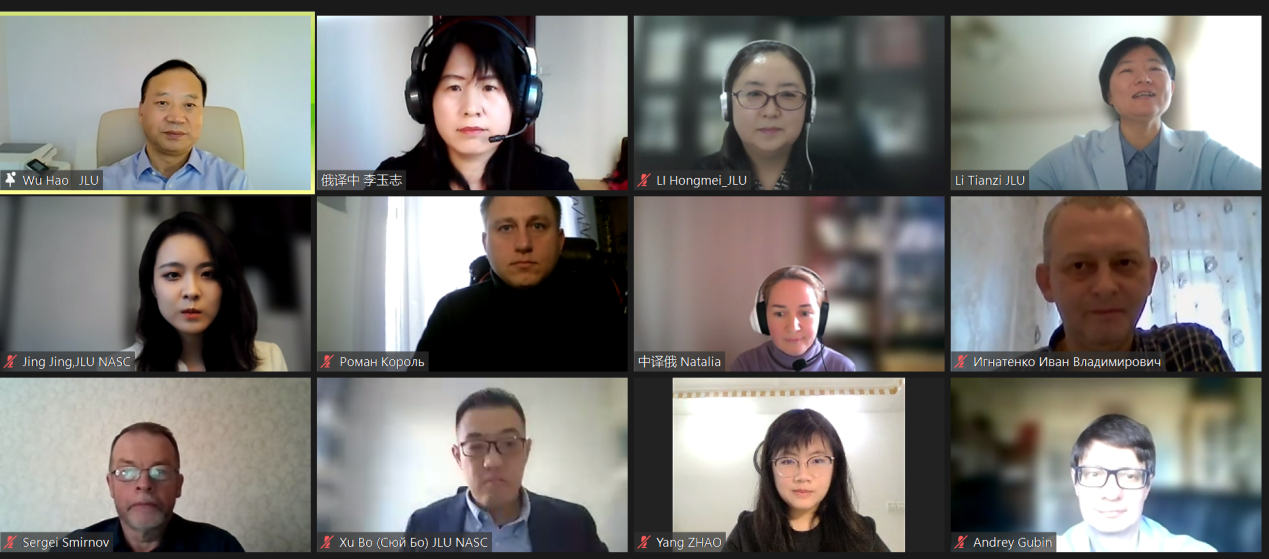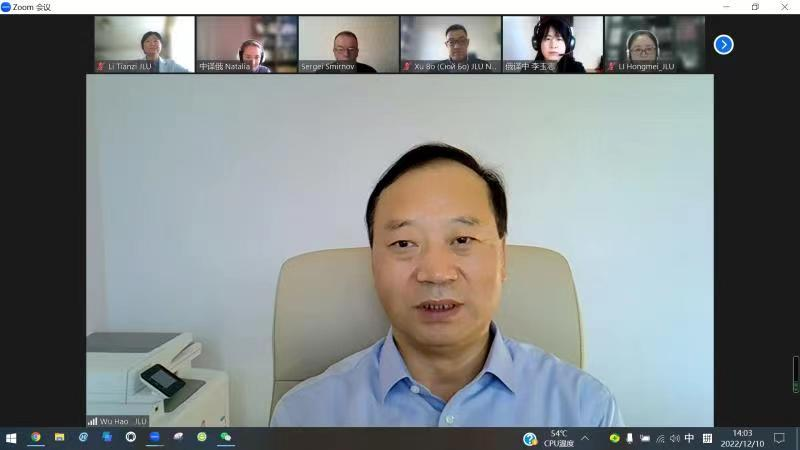On December 10th, 2022, the “International Forum on China-Russia Arctic Development, Transportation and Logistics under New Circumstances” was held at Jilin University (JLU). Jointly sponsored by the Polar Research Center, the Northeast Asian Research Center, and the Northeast Asian Studies College of JLU, the on-line forum was attended by over ten experts and scholars from research institutions including JLU, Far Eastern State Transport University (Russia), Far Eastern Federal University (Russia), and Maritime State University named after G.I Nevelskoy. Prof. Li Tianzi, director of JLU Polar Research Center, presided over the opening ceremony, and Prof. Wu Hao, dean of JLU Northeast Asian Studies College, delivered a speech.
In his opening speech, Prof. Wu noted that recent years have witnessed profound changes in the international situation, which has not only brought great challenges to China and Russia, but also provided unprecedented opportunities for the two countries to deepen cooperation. Extensive and in-depth exchanges in Arctic cooperation, a vital part of the bilateral cooperation, are expected to be carried out so as to jointly promote mutual trust and development between the two countries.
Discussions and in-depth exchanges were conducted by Chinese and Russian scholars on such topics as the transformation of China-Russia Arctic cooperation against the background of Ukraine crisis, and the construction of transportation and logistics infrastructure in international transport corridors. Prof. Roman Grigorevich Krol from Russian Far Eastern State Transport University held that the transportation and logistics markets in Russia and the world alike were undergoing great changes and that the development of transportation and logistics infrastructure in the Far East is a top priority to ensure sustainable external economic relations with northeast Asian countries. Prof. Andrei Vladimirovich Gubin from Far Eastern Federal University briefed on the military direction of Russia’s Arctic policy. Prof. Ivan Vladimirovich Ignatenko from Russian Far Eastern State Transport University introduced the power infrastructure of the Far East railway to cope with extreme climate conditions. Prof. Sergei Maratovich Smirnov from Maritime State University named after G.I Nevelskoy presented the roles played by the Northern Sea Route (NSR) in the Far East supply chain and the Fourth Industrial Revolution (4IR) technology.
On the Chinese side, Prof. Xu Bo from JLU believed that against the background of the current Ukraine crisis, Russia’s Arctic policy embraced a transition period when a new Arctic development plan was laid down to expand the Arctic cooperation with developing countries. Taking Russia’s Far East region as an example, Li Hongmei, associate professor of JLU, introduced the opportunities and challenges faced by China and Russia in transportation and logistics, and how to deepen their cooperation in the field under the new situation as well. JLU Prof. Zhao Yang held that China was supposed to speed up its participation in Arctic affairs cooperation from such “low-politics” perspectives as economic, trade, bilateral and multilateral cooperation when the globalization of the “Greater Arctic” was on the way in terms of Arctic shipping routes development and international cooperation on Arctic affairs. JLU Prof. Li Tianzi mentioned the significance of the northeast shipping route under the background of Russia-Ukraine conflict, the challenges of accelerating the development of the Arctic shipping route under the new situation, the Arctic cooperation between China, Russia and other Northeast Asian countries, the construction of Hunchun Marine Demonstration Zone and other related issues. Dr. Jing Jing from JLU introduced the nature and unique characteristics of Arctic “governance” and the collision of nationalism and globalism in Arctic governance and prospected its future model.
At this international conference, Chinese and Russian experts and scholars exchanged in-depth views on the progress of China-Russia Arctic cooperation under the new situation and conducted discussions on the challenges in China-Russia cooperation in logistics, infrastructure, and advanced technologies of the Arctic shipping route, which would provide intellectual support and viewpoints in promoting sustainable development, utilization and cooperation of the Arctic region.


